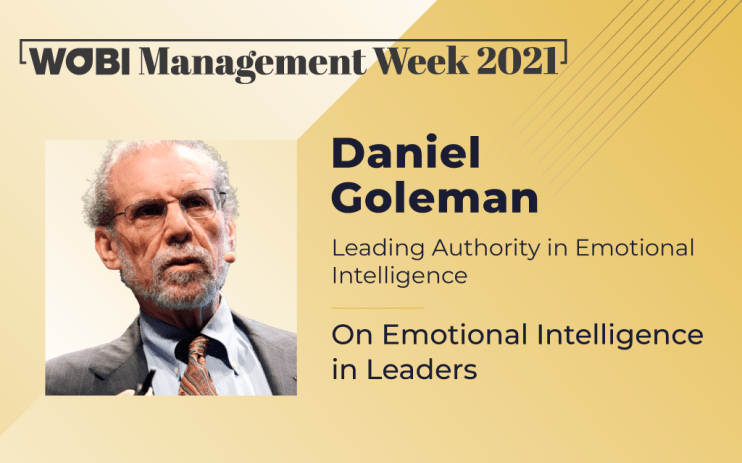
Emotional Intelligence in Leaders

According to Daniel Goleman, renowned psychologist, Emotional Intelligence is more important today than ever. Read this article to discover the impact of EI on leaders and organizations. Daniel Goleman will join the first edition of WOBI Management Week (June 28 – July 1, 2021), a 4-day digital event with world class business thought leaders that will address the latest trends and ideas in today’s most relevant management topics.
We are facing a new reality, a new situation in which relationships have taken on a greater role, transforming the way we interact. Studies reveal that the more Emotional Intelligence we have, the better we will respond to stressful situations. It also improves our mood and gives us greater personal and professional satisfaction.
These studies show that, in the workplace, the more you move up in the organization, the more important Emotional Intelligence becomes. 85% of the competencies that companies consider key in defining a great leader depend on Emotional Intelligence.
In today’s world we have a multitude of constant distractions in our day to day. Studies reveal that the use of technology throughout our day causes us to be distracted 50% of the time on average, even reaching 90% in instances such as during the commute to work. Having this wealth of information at our fingertips in this case means lower quality of attention to a specific task.
It is also important to know the relationship between our performance and our level of Cortisol (a hormone that is released in response to stress). The higher the level of Cortisol, the worse the performance. Cortisol is also positively correlated with motivation, so too low a level of this hormone can also indicate poor performance.
You have to find the perfect level of Cortisol to reach the peak of optimal performance. For leaders to be able to create this optimal state of performance within their teams, it is essential to provide clear objectives and give teams the freedom to achieve them in their own way, providing feedback throughout the process and helping as necessary. Leaders’ degrees of Emotional Intelligence are reflected when leading teams, from which six main leadership styles can be identified:
1. Visionary leader: Creates the best work environment. Provides long-term vision and direction.
2. Leader as Coach: Develops good relationships with employees. Everyone wants to be around the leader.
3. Unifying leader: Creates harmony in labor relations.
4. Democratic leader: Builds commitment through collaboration.
5. Leader who sets the pace: Pushes for tasks and objectives to be accomplished. This is a common profile in organizations and lacks a high level of Emotional Intelligence.
6. Authoritarian Leader: Demands obedience and compliance.
The best leaders use a combination of different leadership styles when appropriate, because they understand that each person and each situation requires a different approach.
Greater Emotional Intelligence in employees and leaders implies greater job satisfaction, greater commitment, less turnover, more positive feelings at work, higher performance, better physical and mental health and a better climate in the organization. High performing organizations have a number of common EI related characteristics such as interpersonal understanding, openness, team selfawareness, self-assessment, responsibility, and constant learning.
To build an emotionally intelligent organization, it is essential to consider these characteristics when hiring new staff, focusing on EI performance and emphasizing the importance of EI in training and developing teams. It is important to integrate EI into the values and principles of the company, thus eliciting the best version of each employee.
If you want to learn more, don’t miss Daniel Goleman in WOBI Management Week, who will reveal the keys to build an emotionally intelligent workplace.